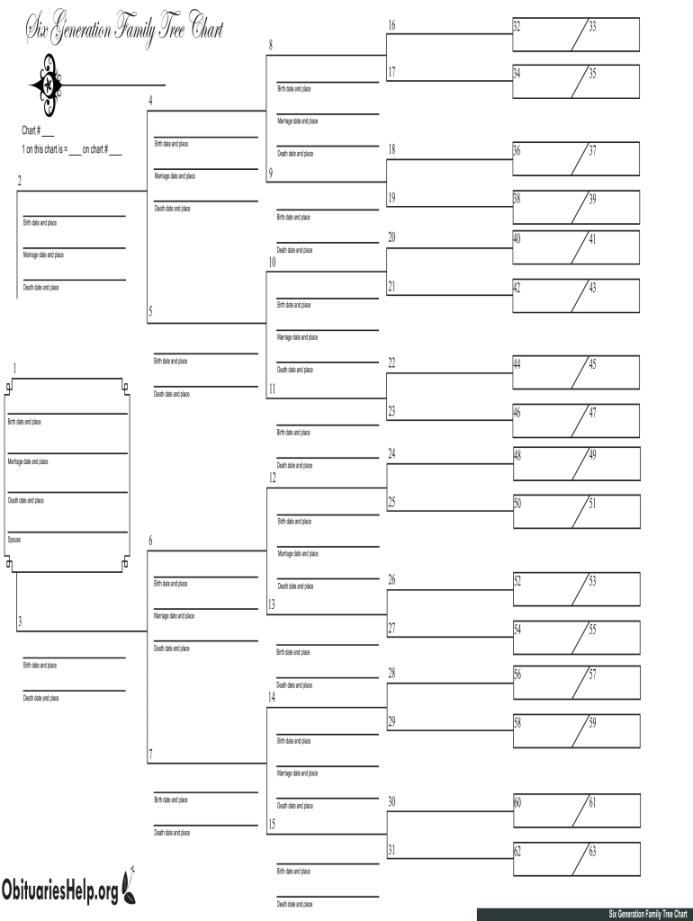A Fill-in-the-blank Family Tree Template is a valuable tool for individuals and families seeking to document and visualize their lineage. By providing a structured framework with designated spaces for names, dates, and other relevant information, these templates facilitate the process of creating a comprehensive and organized family history.
Design Considerations for Professionalism
To convey professionalism and trustworthiness, careful attention must be paid to the design elements of the template.
Font Selection

Image Source: pdffiller.com
The choice of font significantly impacts the overall aesthetic and readability. Opt for clean, classic fonts such as Times New Roman, Arial, or Georgia. Avoid overly decorative or difficult-to-read fonts that can detract from the professional presentation.
Layout and Spacing
A well-organized layout is crucial for clarity and ease of use. Consider using a hierarchical structure to represent family relationships, with clear lines connecting individuals. Ample spacing between lines and sections enhances readability and prevents the template from appearing cluttered.
Color Palette
The color scheme should be carefully chosen to evoke a sense of professionalism and sophistication. Neutral colors such as black, white, gray, and shades of blue or green generally convey a sense of trust and reliability. Avoid overly bright or distracting colors that can make the template appear unprofessional.
Visual Hierarchy
Employ visual cues to guide the user through the template. This can be achieved through the use of bolding, italics, different font sizes, and consistent spacing. These visual cues help to prioritize information and make the template more user-friendly.
Consistency
Maintain consistency throughout the template in terms of font style, size, spacing, and alignment. This creates a polished and professional appearance and enhances the overall user experience.
Key Features of a Professional Template
User-Friendliness
A professional template should be easy to use and understand, even for individuals with limited experience in genealogy. Clear instructions and a user-friendly interface are essential.
Flexibility
The template should be adaptable to various family structures and sizes. It should allow users to easily add or remove branches and accommodate different types of relationships.
Completeness
A comprehensive template should include spaces for all relevant information, such as full names, dates of birth and death, places of residence, marriage information, and any other pertinent details.
Accuracy
The template should be designed to ensure accurate data entry. This can be achieved through the use of clear labels, predefined fields, and built-in validation checks.
Aesthetics
While functionality is paramount, the aesthetic appeal of the template should not be overlooked. A visually appealing template is more likely to engage users and encourage them to complete their family history.
Enhancing the User Experience
Clear Instructions
Provide clear and concise instructions on how to use the template. This may include a brief guide on filling out the information, tips for conducting genealogical research, and suggestions for organizing and storing the completed family tree.
Customization Options
Offer users the ability to customize the template to suit their specific needs. This may include options to change the font, color scheme, and layout.
Interactive Features
Incorporate interactive features such as drop-down menus, checkboxes, and data validation tools to enhance the user experience and minimize errors.
Accessibility
Ensure the template is accessible to users with disabilities. This may involve using appropriate font sizes, providing sufficient color contrast, and ensuring compatibility with assistive technologies.
Conclusion
By carefully considering the design elements, incorporating key features, and enhancing the user experience, you can create a professional Fill-in-the-Blank Family Tree Template that is both functional and visually appealing. Such a template will not only assist individuals and families in documenting their heritage but also serve as a valuable resource for future generations.